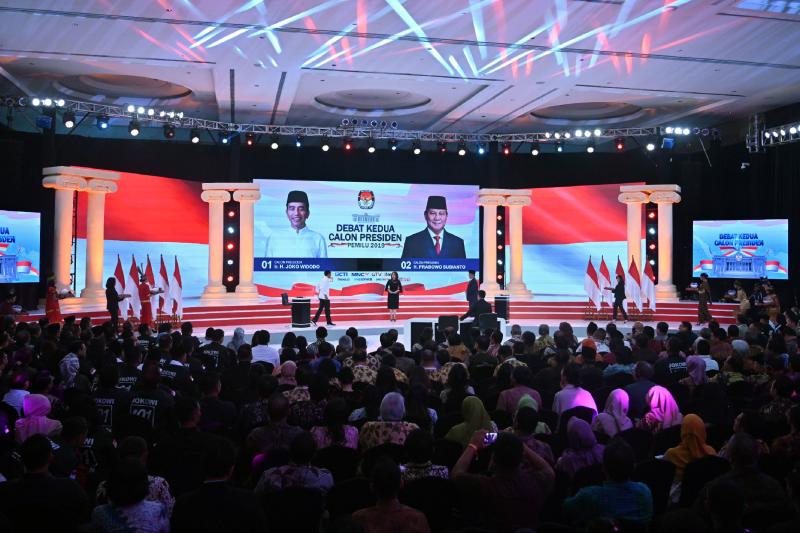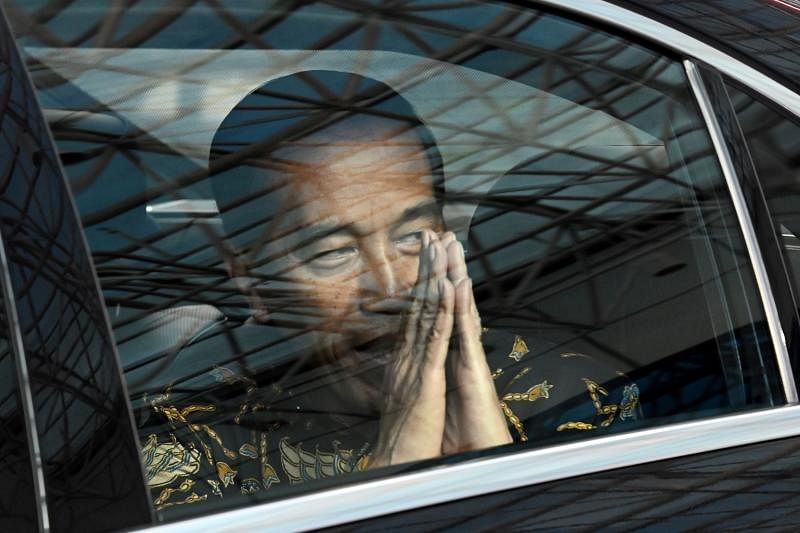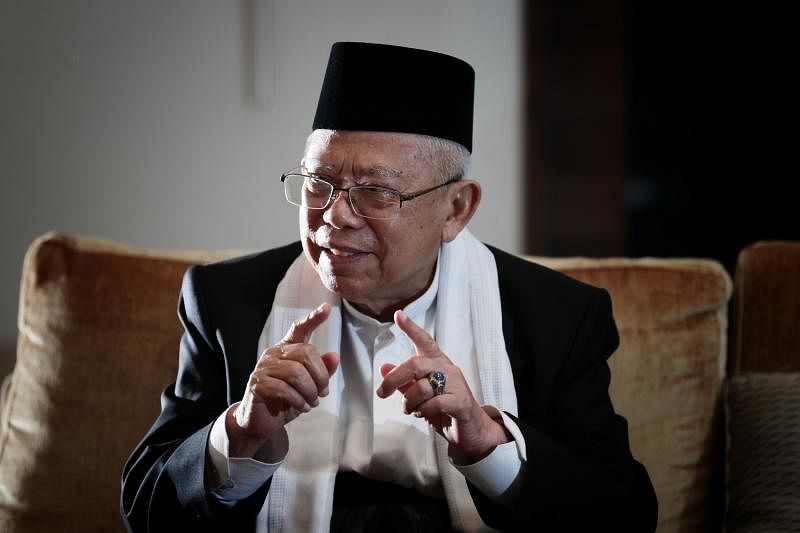Indonesia votes: Who are running for president and vice-president?
Sign up now: Get insights on Asia's fast-moving developments

The second presidential debate between incumbent President Joko Widodo and retired army general Prabowo Subianto in Jakarta on Feb 17, 2019.
PHOTO: AFP
Nur Asyiqin Mohamad Salleh
Follow topic:
JAKARTA - When Indonesians cast their votes on April 17, all eyes will be on the main contest between incumbent President Joko Widodo and retired army general Prabowo Subianto, in what is expected to be a tight rematch of the 2014 presidential polls.
For Mr Joko, the upcoming election will be a referendum on his presidency, while Mr Prabowo will be hoping that he will be third time lucky, having also contested previously as a vice-presidential candidate.
Polls show Mr Joko having a double-digit lead over Mr Prabowo, but the gap appears to be narrowing.
The Straits Times takes a look at the two top candidates and their running mates.
MR JOKO WIDODO, 57
Indonesian Democratic Party of Struggle
The furniture businessman-turned-politician rode a wave of hope to the presidential office in 2014, when he bested a blue-blooded challenger to become Indonesia's seventh president - and its first from outside the elite political and military circles. Mr Joko promised change, and his election was then widely regarded as a new dawn in Indonesian politics.

As he seeks a second term, he will have to prove that he has delivered during his time in office, particularly in his infrastructure push, beefing up the economy and raising wages.
Born and raised in Solo, in Central Java, the President, or Jokowi as he is commonly called, is the son of a wood seller. He would go on to set up his own furniture manufacturing business before turning to politics.
His political foray started when he was elected mayor of Solo in 2005, and then re-elected for a second term in 2010, with more than 90 per cent of the vote. He then went on to contest - and win - the 2012 Jakarta gubernatorial election.
At his peak, his approval ratings rose to almost 70 per cent, with several surveys released in October 2018 showing he would have won an election by a landslide if polls had been held then. That was a far cry from his winning margin in 2014, when he defeated Mr Prabowo with 53.15 per cent of the vote.
On the surface, Mr Joko remains a popular figure, rarely ever losing his place at the top of nationwide electability surveys, leading many pundits to say that the upcoming election is the President's to lose.
DR MA'RUF AMIN, 75
Independent

One of the most influential Muslim figures in Indonesia, Dr Ma'ruf currently chairs the Indonesian Ulama Council - the country's top Islamic clerical body.
He was also supreme leader of Nahdlatul Ulama (NU), the largest Muslim organisation in Indonesia, until his resignation after he was nominated to be Mr Joko's running mate last year.
But Dr Ma'ruf is no stranger to politics and governance either, having served as a regional legislator and lawmaker. He was also a key member of the Presidential Advisory Council in former president Susilo Bambang Yudhoyono's administration.
The decision by the coalition behind Mr Joko's re-election bid to pick Dr Ma'ruf came as a surprise to many.
As a reformist with no ties to the military or political blue blood, Mr Joko is often the target of entrenched interest groups trying to undermine him and his allies.
In recent years, his opponents have used Sara - the Indonesian acronym for ethnicity, religion, race and class - against him, to the extent of blatantly questioning whether the President was "Muslim enough".
Such issues had plagued the last Jakarta election when the incumbent Basuki Tjahaja Purnama, who is Chinese and Christian, and a close ally of Mr Joko, lost to Muslim rivals backed by Mr Prabowo.
Although the decision to go with Dr Ma'ruf would be questioned by liberals across the country, analysts have said there is little downside in picking a candidate who could beef up the President's position with the conservatives in a country with the world's largest Muslim majority.
MR PRABOWO SUBIANTO, 67
Gerindra

With his long service in the military and deep ties to the business and political elites - he was married to one of former president Suharto's daughters, and his father was a minister and central bank chief - Mr Prabowo, a former army general, is Mr Joko's polar opposite.
He went into business after being discharged from the military following the end of the New Order regime, and later entered politics.
In 2004, he was among the contenders vying to become a presidential candidate for Golkar, Indonesia's grand old party, but he received the lowest number of votes.
Four years later, he founded Gerindra, in part to support his own presidential bid in 2009 - but the party managed to win only 26 out of 560 seats in Parliament and could not field a presidential candidate.
Former president Megawati Soekarnoputri, who is also the daughter of Indonesia's founding president Sukarno, later picked Mr Prabowo as her running mate for the race, which they eventually lost to then President Susilo Bambang Yudhoyono.
Mr Prabowo's candidacy for the 2019 race was widely anticipated although the former Indonesian special forces commander had appeared to be dragging his feet over the nomination until it was officially announced in April last year.
He has built up a base among voters who see him as a firm, decisive leader, his human rights record notwithstanding.
Mr Prabowo has also been touted as a kingmaker in Indonesian politics, having backed the pairing of candidates Anies Baswedan and Sandiaga Uno, who beat the popular Basuki Tjahaja Purnama during the 2017 gubernatorial election in Jakarta.
MR SANDIAGA UNO, 49
Independent

The former businessman - who in 2013 was ranked the 47th richest man in Indonesia - made his foray into politics in 2015, and quickly charted a meteoric rise through the ranks of Mr Prabowo's Gerindra party.
He was named Mr Anies Baswedan's running mate for the 2017 Jakarta gubernatorial election, which they later won.
But Mr Sandiaga, affectionately known as Sandi among his supporters, would resign as Jakarta's deputy governor after just 10 months on the job when he was selected by Mr Prabowo to contest for the vice-presidency.
Although often described as a reluctant politician, Mr Sandiaga was the first to throw his hat in the ring to challenge the popular Basuki Tjahaja Purnama to be Jakarta governor in 2015.
He would eventually contest as the running mate of Mr Anies, who defeated Mr Basuki in what was widely regarded as a divisive election.
His immense wealth, however, has attracted controversy.
In 2016, he had to publicly deny any wrongdoing when his name appeared in the Panama Papers, which detailed the offshore tax havens of the ultra rich.
But before Mr Sandiaga entered politics full time, he had already stepped down from all 18 companies he was associated with.
Analysts have coined the term "the Sandiaga effect", following his rising appeal to women, youth and voters with higher education, with some saying that he may do more to beef up Mr Prabowo's chances at the polls than his counterpart Dr Ma'ruf can do for Mr Joko.
Surveys done shortly after nomination day in August 2018 also showed an increase of between 4 percentage points and 7 percentage points for Mr Prabowo from the same voter segments after he announced Mr Sandiaga as his No. 2.
So while observers remain divided on whether Dr Ma'ruf is helping or hindering Mr Joko's electoral prospects, a common view is that Mr Prabowo has the better running mate.

